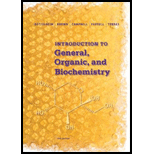
Concept explainers
Interpretation:
The isotope which is likely to be more radioactive between Nitrogen-14 and Nitrogen-13 should be identified.
Concept Introduction:
The isotopes with the unstable nucleus of an element are converted to a stable nucleus by emitting radiation in the form of beta, alpha, or gamma radiation is said to be a radioactive isotope.
Interpretation:
The isotope which is likely to be more radioactive between Phosphorus-31and Phosphorus-33 should be identified.
Concept Introduction:
The isotopes with the unstable nucleus of an element are converted to a stable nucleus by emitting radiation in the form of beta, alpha, or gamma radiation is said to be a radioactive isotope.
Interpretation:
The isotope which is likely to be more radioactive between Lithium-7 and lithium-9 should be identified.
Concept Introduction:
The isotopes with the unstable nucleus of an element are converted to a stable nucleus by emitting radiation in the form of beta, alpha, or gamma radiation is said to be a radioactive isotope.
Interpretation:
The isotope which is likely to be more radioactive between Calcium-39 and calcium-40 should be identified.
Concept Introduction:
The isotopes with the unstable nucleus of an element are converted to a stable nucleus by emitting radiation in the form of beta, alpha, or gamma radiation is said to be a radioactive isotope.
Want to see the full answer?
Check out a sample textbook solution
Chapter 9 Solutions
Introduction to General, Organic and Biochemistry
 Introduction to General, Organic and BiochemistryChemistryISBN:9781285869759Author:Frederick A. Bettelheim, William H. Brown, Mary K. Campbell, Shawn O. Farrell, Omar TorresPublisher:Cengage Learning
Introduction to General, Organic and BiochemistryChemistryISBN:9781285869759Author:Frederick A. Bettelheim, William H. Brown, Mary K. Campbell, Shawn O. Farrell, Omar TorresPublisher:Cengage Learning General, Organic, and Biological ChemistryChemistryISBN:9781285853918Author:H. Stephen StokerPublisher:Cengage Learning
General, Organic, and Biological ChemistryChemistryISBN:9781285853918Author:H. Stephen StokerPublisher:Cengage Learning Chemistry: The Molecular ScienceChemistryISBN:9781285199047Author:John W. Moore, Conrad L. StanitskiPublisher:Cengage Learning
Chemistry: The Molecular ScienceChemistryISBN:9781285199047Author:John W. Moore, Conrad L. StanitskiPublisher:Cengage Learning Chemistry & Chemical ReactivityChemistryISBN:9781337399074Author:John C. Kotz, Paul M. Treichel, John Townsend, David TreichelPublisher:Cengage Learning
Chemistry & Chemical ReactivityChemistryISBN:9781337399074Author:John C. Kotz, Paul M. Treichel, John Townsend, David TreichelPublisher:Cengage Learning Chemistry by OpenStax (2015-05-04)ChemistryISBN:9781938168390Author:Klaus Theopold, Richard H Langley, Paul Flowers, William R. Robinson, Mark BlaserPublisher:OpenStax
Chemistry by OpenStax (2015-05-04)ChemistryISBN:9781938168390Author:Klaus Theopold, Richard H Langley, Paul Flowers, William R. Robinson, Mark BlaserPublisher:OpenStax





